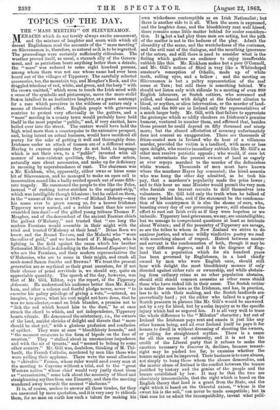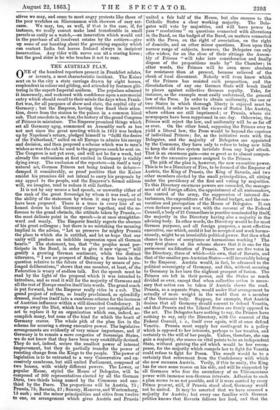TOPICS OF THE DAY.
THE "MASS MEETING" ON SLIEVENAMON.
MENACES which do not terrify always excite amusement, and the mixture of laughter and scorn with which all decent Englishmen read the accounts of the "mass meeting" on Slievenamon is, therefore, as natural as it is to be regretted. The proceedings were certainly sufficiently ridiculous. The weather proved itself, as usual, a staunch ally of the Govern- ment, and as patriotism bears anything better than a drizzle, the "mass" was reduced to some eight hundred persons, among whom there was not one whose name had ever been heard out of the villages of Tipperary. The carefully selected accessories, too, the mountain top, and Meagher's Rock, and the draggled tricolour of red, white, and green, and the harp "with the crown omitted," which seem to touch the Irish mind with a sense of the symbolic and picturesque, move the more stolid Saxon intellect to an instinctive laughter, or a grave contempt for a race which perceives in the wildness of nature only a means of theatrical effect. English people with grievances contrive to protest very effectually in the gutters, and a "mass" meeting in a county town would probably have held itself in the most popular "public," and, if very excited, have boiled over into the street. The orators would have held the high wind more than a counterpoise to the extensive prospect, and, being intent on actual business, would have sacrificed all poetry for the sake of getting it well and thoroughly done. Irishmen under an attack of treason are of a different mind. Having to express opinions they do not hold, in language which is not their own to a "public" invested with all manner of non-existent qualities, they, like other actors, naturally care about accessories, and make up for deficiency in meaning by superabundance of rant. The chairman was a Mr. Kickham, who, apparently, either owns or hires some bit of Slievenamon, and he managed to make an open call to insurrection sound like a badly recited speech out of some fifth- rate tragedy. He summoned the people to rise like the Poles, instead "of rushing terror-stricken to the emigrant-ship," which was intelligible though felonious ; but he called on them, in the "names of the men of 1848—of Michael Doheny—may his name ever be green among us, for a braver Irishman Tipperary never nursed, and a nobler heart than his never crumbled into dust!—of the gifted young tribune Thomas F. Meagher, and of the descendant of the ancient Feenian chiefs the gallant Olfahony," and trusted that "ere long the modern Feenians would assemble in their might with the tried and trusted Olfahony at their head." Brian Born we know, and the Round Towers, and the Malachi who "wore the collar of gold," and we have heard of F. Meagher, who is fighting in the field against the cause which his brother Nationalist Mitchell is defending in the Richmond Enquirer ; but who are the Feenians' and their modern representatives the Olfahonies, who are to come in their might, and crush all snub-nosed Saxon Smiths and Browns? We trust the present generation are as mythical as their great ancestors, for if not their chance of penal servitude is, we should say, quite an appreciable quantity. The speech of the day, however, was that of Mr. Gill, Editor, says the report, of the TipperaryAdvocate. He understood audience better than Mr. Kick- ham, and after a solemn and fearful pledge never, never "to exercise his paltry privilege of giving a vote,"—uttered, we imagine, to prove, what his coat might not have done, that he was no non-elector,—and an Irish blunder, a promise not to "lick the rod which bound him to the dust," he at once struck the chord to which, and not independence, Tipperary hearts vibrate. He denounced the aristocracy, i.e., the owners of the land, amidst shrieks of delight and threats that "more should be shot yet," with a glorious profusion and confusion of epithet. They were at once "bloodthirsty hounds," and "the meanest creatures in the form of bipeds on the face of creation." They "stalked about in unconscious impudence and with the air of tyrants," and "seemed to belong to some other country." Mr. Gill was, doubtless, thinking of M. Thi- bault, the French Catholic, murdered by men like those who were yelling their applause. There were the usual allusions to " chivalric " France, whose ruler would send every man at the meeting to Cayenne without a trial, and to the "great Western nation" whose chief would very justly shoot them as "secessionists," some talk about the necessity of blood and straightening scythes from one Finnerty, and then the meeting wandered away towards the nearest " shebeens."
It is, of course, useless to answer all these tirades, for they are answered by mere quotation, and it is very easy to ridicule them, for no man on earth has such a talent for making his own wickedness contemptible as an Irish Nationalist; but there is another side to it all. When the scorn is expressed, and the laughter done, and the bloodthirsty rant well hissed, there remains some little matter behind for cooler considera- tion. It ii,,but a bad play these men are acting, but the pith of the matter is not in the badness of the play. Admit the absurdity of the scene, and the wretchedness of the costumes, and the evil rant of the dialogue, and the mouthing ignorance of the actors, and still there is need to consider what is the feeling which gathers an audience to enjoy insufferable rubbish like this. Mr. Kickham makes but a poor O'Connell, and Mr. Gill's notion of Shiel is very like a Whitechapet amateur's conception of Othello, made up of white teeth, rolling eyes, and a bellow ; and the meeting on Slievenamon is but a paltry representation of the real scene at Tars; but still there is something behind. We should not listen only with ridicule to a meeting of even 800 English labourers, or Scotch cottiers, who screamed and yelled, and danced with delight at the faintest allusion to blood, or scythes, or alien intervention, or the murder of land- lords, and the 800 are in Ireland only the representatives or a much larger body. Mr. Gill, with that failure to appreciate the grotesque which so oddly checkers an Irishman's genuine humour, ventured to number them, and affirmed that, besides those present he could depend on fifty thousand and ninety more; but the absurd affectation of accuracy unfortunately does not conceal an exaggeration. There are thousands of frieze-coated men in Ireland who do hear of a villanons murder, provided the victim is a landlord, with more or less. open delight, who receive incendiary rubbish like Mr. Gill's as other men receive patriotic appeals ; who would, if once let. loose, exterminate the present owners of land as eagerly as ever sepoys marched to the murder of the defenceless. white women. Thousands of men must have known where the murderer Hayes lay concealed; the hired assassin who was hung the other day admitted, as he took hire pay, that a murderer's popularity made the price lower ;. and to this hour no sane Minister would permit the very men. who furnish our bravest recruits to drill themselves into volunteers. Mr. Gill told only the truth when he talked of the army behind him, and if the statement be the condemna- tion of his countrymen it is also the shame of ours, who, boasting every day of our governing power, still abandon the effort to root out Irish evils as if they were hopeless or we- imbecile. Tipperary land grievances, we say, are unintelligible but we manage to comprehend questions at least as intricate about Waiters; and if the peasantry of Tipperary are savage,. so are the tribes to whom in New Zealand we strive to de anxious justice, and whose wildly vindictive poetry we read with something almost of respect. Hatred between master and servant is the condemnation of both, though it may be- in very different degrees, and it is the disgrace of Eng- land that a population which for six hundred years. has been governed by Englishmen, in a land chiefly owned by men who were English once, should stilt hear with delight the most bloodthirsty menace if only directed against either rule or ownership, and while abstain- ing from ordinary crime as no other population abstains, should still shield common assassins as other races shield those who have risked life in their cause. The Scotch cottier is under the same laws as the Irishman, and has, in practice,. less to do with their making, and the Scotch landlords are- proverbially hard ; yet the editor who talked to a group or Scotch peasants in phrases like Mr. Gill's would be answered not by a cry for blood, but by a calm inquiry as to the specifie injury which had so angered him. It is all very well to trace the whole difference to the " 3filesian" character; but out of Ireland the Irishman pays rent and exacts it just like any other human being, and all over Ireland itself he pays it for houses to dwell in without dreaming of shooting the owners,. or yelling for straightened scythes. There is a cause for all this excess of animosity, and it is not to the credit of the Liberal party that it refuses to make the exertion necessary to discover it, declines, because tenant- right may be pushed too far, to examine whether the tenure might not be improved. Their business is to cure abuses, not simply to hang those whom the abuses demoralize, and the master abuse of Ireland is the conflict between the tenure justified by history and the genius of the people and the tenure established by law. It may be that the two are absolutely irreconcilable, that the right which is based on the English theory that land is a grant from the State, and the right which is based on the Oriental axiom, "whose is the sweat his is the soil," can never be made compatible ; but m that ease let us admit the incompatibility, invent what path, saves we may, and cease to meet angry protests like those of the poor wretches on Slievenamon with showers of easy sar- casm. We may, too, as well, if that is the case, if, for instance, we really cannot make land transferable in small parcels as easily as a watch,—an innovation which would end in the purchase of all insolvent estates by the cottiers—give up some of our boasting about the governing capacity which can content India but leaves Ireland always in incipient insurrection. Any rider with nerve can sit a rearing horse; bat the good rider is he who teaches it not to rear.































 Previous page
Previous page